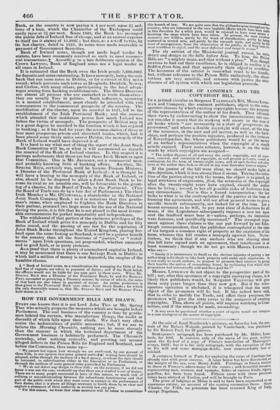HOW THE GOVERNMENT BILLS ARE DRAWN.
EVERY one knows that it is not Lord John This or Mr. Spring That who actually prepares the measures which are brought before Parliament. The real business of the country is done by gentle- men behind the curtain, who manufacture things, the credit or discredit of which falls upon their chiefs. We don't very often notice the technicalities of public measures ; but, if we are to believe the Morning Chronicle, nothing can be more slovenly than the manner in which the technical department of the Government business is habitually performed. The Chronicle yesterday, after noticing critically, and pointing out several alleged defects in the Prison Bills for England and Scotland, now before the Commons, thus sums up- " We cannot but repeat how strongly we are confirmed, by our perusal of these bills, in our opinion that some general inetlit d 0: waiting laws should be adopted, either through the medium of a fixed agency, to whom the duty should be intrusted, in subordivation either to the Executive or to Parliament, or through the medium of some general rules prescribed by Parliament. " We do not detect any design in these bills ; on the contrary, if we did not know it was not the case, we should say that there was a studied want r f design. There are so many people concerned in laws of this nature, so much risk of colliaioa or misunderstanding between the subordinate functionaries and that part of the public with whom they must come in contact in the performance of their duties, that it is above all things necessary to fortify them by as clear and explicit a statement of their authority as written law can give.
" For this mann, we trust that some measures will be takes to consolidate
this branch of law. We are quite sure that the philanthropists throughoutt h country, who are interested in the very laudable efforts which have been made in this direction for a while past, would be rejoiced to have some meag knowing the steps which have been taken. At present, the most excella measures in hidden, partly by the want of classification, partly by being scattered In several acts, and partly by the uncouth style, and partly by want of arrangement, from the observation of the public, as if they were the most worthless in object, and the most deficient and inapt in means."
The sly satirist of the Ministerial journal cannot, he says detect any design in the bills before him. To him, the Prise; Bills are "a mighty maze, and that without a plan." Nay, though anxious to find out their excellence, he is obliged to confess it is hidden from him, and that apparently their object is worthiest. The keenness of the satirist is somewhat cruel to his friends; but, without reference to the Prison Bills exclusively, the obser. vations are very sensible, and censure with justice the utter absence of all system with which our legislation proceeds.


























 Previous page
Previous page